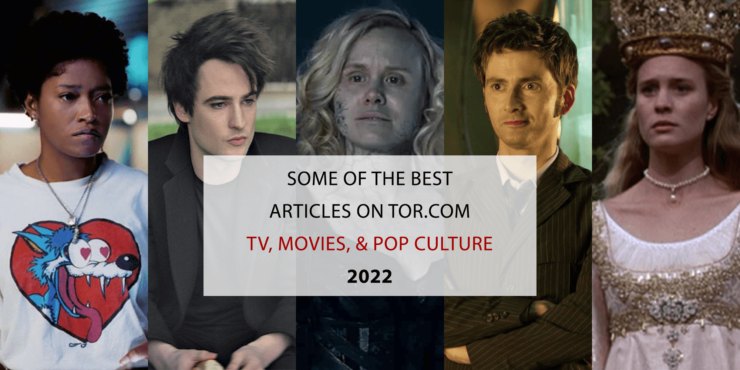Welcome to the Tor.com’s yearly round-up of some of our favorite articles from the last year! In case you missed it, there’s a separate list for discussions about fiction, reading, writing, and all things book-related; the list below highlights essays about the wider popular culture, with a focus on TV and film in particular.
While both lists are focused on standalone essays and articles, we’re also quite proud of all the television reviews and movie coverage we’ve published in 2022—it’s been a banner year for SFF series and films, from epic fantasy shows and superhero stories to the greatest pirates of all time and the glorious goofiness that is Weird Al. There’s so much to talk about, so we hope that you enjoy the selections below, and please feel free to tell us about the articles and columns (and movies and shows) that struck a chord with you in the last twelve months…
Some of the Best Things About Television in 2022
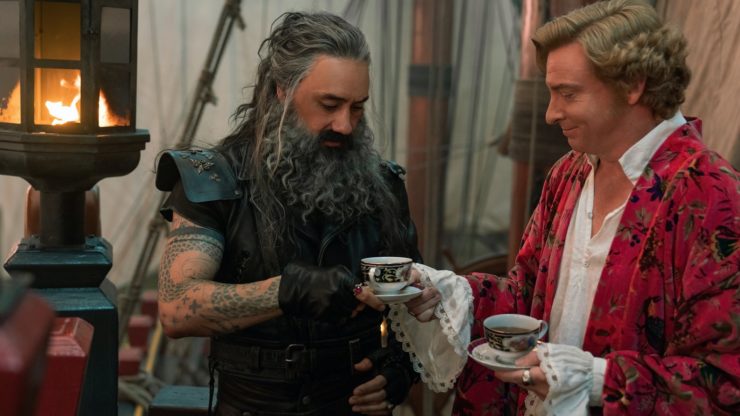
How Star Trek: Strange New Worlds Reimagines the “Hero’s Journey” for the Better by Emmet Asher-Perrin
It’s been said before in a multitude of ways, but it does bear repeating: The Hero’s Journey has fucked us up as a culture.
That probably sounds harsh to some, but there’s an important core of truth in the sentiment. In a century that is currently being defined by our absorption in superhero narratives, the pop culture consuming public has been inundated with stories about larger than life figures who commit feats of great heroism. Usually those feats require untold physical strength, unique moral fiber, adamantium will. We only have room for people who commit acts that are writ large, on a mountain face or across the multitude of screens we use every day, and we aren’t stopping to consider how that might shape our beliefs about what in life is worthwhile, or how we can best offer our help to others.
Which is why Captain Pike’s arc in Strange New Worlds is honestly a thing of beauty.
The Sandman’s Standout Episode Is a Great Work of Adaptation by Leah Schnelbach
“The Sound of Her Wings” is practically perfect in every way. In the context of The Sandman as a whole the issue is the turning point when the series shifts from horror comic to dark fantasy. It shows us a new side of Dream—instead of a vengeful escaped prisoner or the Forbidding Lord of a Terrifying Realm, he’s now a mopey little brother. After hearing hints of other Endless, we finally meet one of them, and get a sense that this is a large, fractious family that functions more or less like a human one. And the one we meet is Death.
Russian Doll Shows Us How Necessary — and Awful — Reconciling Trauma Can Be by Emmet Asher-Perrin
Committing to working through things for yourself, acknowledging that you’ve got some trauma to parse out, that’s only the start of the story, but it’s often where people stamp THE END and step away. The part that comes next is inevitably messier, uglier, and often feels like spinning your tires on an empty dirt road at night with no sign posts for direction or scenery for distraction. And that’s where Nadia and Alan are headed for the entirety of Russian Doll’s second season.
Masculinity, Monstrosity, and Queer Catharsis in Our Flag Means Death by Maya Gittelman
Every time there’s queer energy in an ongoing genre show it always feels like Schrödinger’s Queerbait—are they going to go for it or am I going to get hurt? Are they leaning into the story they’re telling, or are they going to tell a worse story by ignoring the character dynamics they chose to put onscreen and instead rely on lazy compulsory heteronormativity to take the show in the most predictable possible direction in what posits to be risk avoidance but which is really code for the boring fact of homophobia. Schrödinger’s Queerbait: Is the queer romance dead or alive? Mostly, it’s dead. […]
So when I realized that Our Flag Means Death is actually telling the queer story it felt like it’s telling—fully, and tenderly—it was like the world cracked open in the best way.
Storytelling Choices and Pop Culture
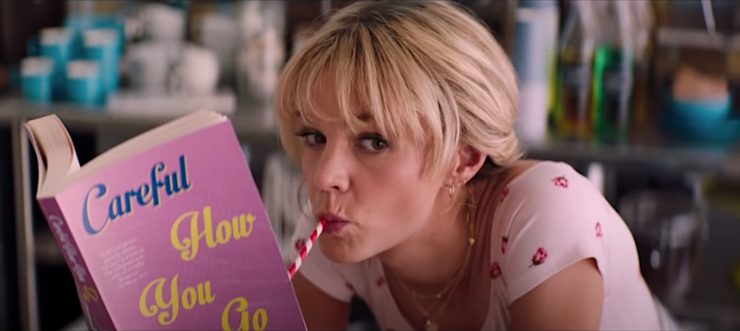
From Now on I’m Taking All of My Storytelling Lessons From This Wild Epic About Love, Loyalty, and Necromancy by Kali Wallace
[H]ere’s the thing: spending time with fiction that is very much not for you is not just good for you as a person, in some vaguely philosophical sense of learning not to be an obnoxious dick, but it is also ruthlessly, pragmatically good for you as a writer. When you don’t automatically understand the basic cultural foundations of a story, you have to pay attention to what the characters say, what the authorial voice says, what the actions and consequences say, and whether all those things are in agreement. You have to pay attention to the assumptions that are built into every choice, to the personal and political consequences, and how it all adds up into triumph or tragedy.
You have to pay attention to what matters in a fictional world, because without understanding why characters make the choices they do, you won’t be able to understand the difference between a story that falls flat and one that has profound emotional impact. And understanding it in other people’s stories is a key step toward understanding it in your own.
Empathy for the Devil: Villains, Antiheroes, and Origin Stories by Stina Leicht
Lately, the intent behind villain backstories seems to be normalization, even aspiration. Why do the long, hard, painful work of improving and fixing problems in a civilized democracy when you can shoot somebody in the face, say something snarky, and walk away? Look at me, the Joker insists. Feel sorry for me. Ignore the people I horribly murdered. I’m the one you should feel sorry for!
Feel eerily familiar? It should. Because that’s the sound of the establishment re-asserting itself. When our nation takes steps toward correcting injustice, there’s always a political backlash AND a cultural one. The fear of change is a strong motivator. These stories are a part of America’s collective unconscious desperately trying to reassure itself: “See? Being the villain of the story isn’t that bad. I’m not evil. I’m just drawn that way. You don’t understand me! That’s just the way it is! The big fish eat the little fish. Why should I feel guilty about that? I’m not the one who created this system!”
So, what does all this mean? Do we stop consuming villain backstories?
Promising Young Woman Is the Gritty Superhero Movie I Always Wanted by Leah Schnelbach
I came to Promising Young Woman a little late—after it won an Oscar, long after most of The Discourse around the film had already died off. About ten minutes in I knew I loved it, and hoped it could sustain its chaotic energy. An hour in, it was my favorite movie of the year. And about fifteen minutes after that, when I’d gotten more coffee and embarked on an immediate second viewing, I figured out why: this is the superhero movie I’ve always wanted, but never thought I’d get.
Content warning—this movie is about assault and violence, and we’ll be talking about that, so tread carefully if you need.
SFF’s Big Fat Problem by R. K. Duncan
In my lifetime, SFF has become unimaginably more welcoming of my queer self than it was when I began to read. My fat self, not so much. This essay is a callout for everyone who feels they are a part of this community. Do better. Think twice before you consume or recommend a movie or show that uses fat suits and fat stereotypes. Notice where your favorites pivot to the monstrous fat villain, or shorthand a lazy, unfit coward with a swollen belly and a sweaty brow. Call out your friends and favorite authors when they do. Warn your fat friends before they blunder into stories that hate them. I want this to change.
American Empire, Biblical Prophecy, and Cosmic Horror in Jordan Peele’s Nope by JR. Forasteros
The Haywoods are not unlike Peele himself, a Black director who owns his own production company (Monkeypaw) and has made a point of giving Black actors, directors, and storytellers space where they’ve been historically underrepresented—namely, Hollywood. But Nope can’t help but ask…is the entire endeavor rotten to the core? Does any attempt to carve out a space in Hollywood and participate in its mythmaking ultimately lead to being swallowed whole, caught up in the inexorable drive for content, for dollars, for spectacle? […]
The impulse to capture, control, and contain is the same impulse that builds empires, that colonizes and appropriates. There is a way to live in harmony—with the world, with one another, with the great mysteries of the universe. But empire-building is not that.
Thoughts on Identity and Representation
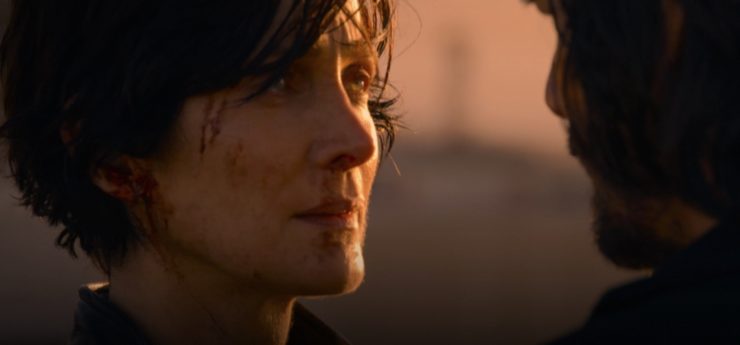
In Case You Didn’t Notice, The Matrix Resurrections Is a Trans Love Story by Emmet Asher-Perrin
In many ways, I think that there is no joy more clarifying than being a trans person in love with another trans person. Because they can see you, and you can see them. Because you both know how it feels when the world glosses you over, gilds you in trappings that ache more each day, and punishes you when you don’t fit. When you’re a trans person in love with another trans person, there is no need to act anything out. Physical transition or not, with hormone replacement or without, dysphoria raging or mercifully quiet, it doesn’t make a whit of difference: they will always see the person you want to be.
And Neo can see Trinity. And she can see him.
“The Proper Pronoun for When One Shares One’s Body With One’s New Friend”: A Transgender Reading of Star Trek: Picard by Jaime Babb
…[U]pon reflection, it occurs to me that what most caught my attention about Agnes’s character arc was how it resonated with my own personal experience as a transgender woman.
Now, of course, I have no reason to believe that Agnes, the character, is transgender; that’s not what this essay is about. But I hope that it’s uncontroversial to say that her arc across the second season is a transition narrative: the story of a character who starts out as one thing (a brilliant but neurotic and deeply unhappy human scientist) and ends up as something quite different (the freaking Queen of the Borg). What’s more, it is a story about Agnes coming into her power through a personal transformation that many would consider wrong or even monstrous; about finding where she belongs and becoming who she was (in this case literally) always destined to be. It is, in short, a story about one woman’s self-actualization through transition.
Star Trek, Wah Chang, and the Ongoing Legacy of “Balance of Terror” by Tim Ford
When, at long last, the commander and Kirk communicate directly, in the last moments of their cat-and-mouse game, and the Romulan says “You and I are of a kind. In a different reality, I could have called you friend,” it’s not cheap sentiment. It is a deliberate point that brings home the reality that the entirety of their conflict was driven by political powers beyond their control.
It is echoed in the closing lines of the episode, as Kirk speaks with the widow of the one casualty on the Enterprise, who had been set to marry in the opening scene. “It never makes any sense,” Kirk says. “We both have to know that there was a reason.” His troubled face after he departs, however, shows that he doubts his own words. Was there a reason? Was there any need for any of it?
What’s truly striking about this message, these troubling questions that the episode raises, is that the same questions arise when we look at the behind-the-scenes story of its production and the treatment of sculptor and prop maker Wah Chang.
Celebrating and Rethinking the TV and Movies We Grew Up With
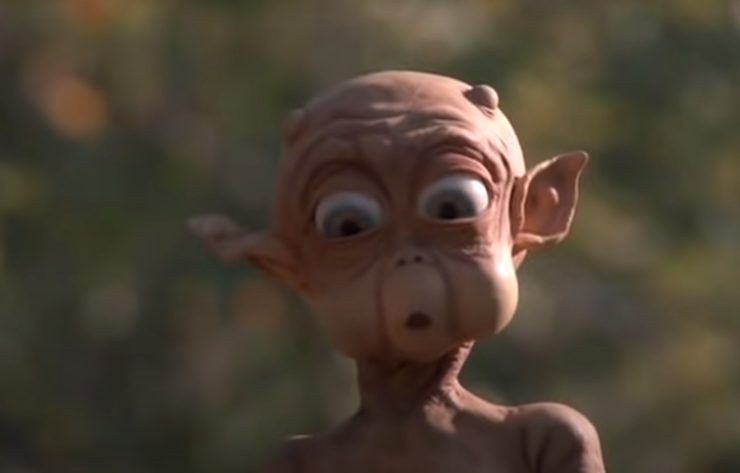
Mac and Me (and Me) by Henry Hoke
…Christine Ebersole, playing Eric’s mom, wheels him through their new house on an excited tour: “Did you notice my dear that there is not one step in the entire place?” she beams, “Low counters, wide hallways, and you can see out of every window!” This was true of my house. Eric was like my mom, and Jade Calegory, the actor with spina bifida who portrays him, navigates space with the naturalism I knew from my home life. As he transfers from bed to wheelchair, and rolls through public places, the film normalizes his experiences with limited mobility. It isn’t a big deal. Eric is just the kid who meets the alien, who happens to use a wheelchair. He’s never portrayed as pitiful or tragic, nor does the supernatural Mac “heal” him. The alien fam rallies to resurrect him from the dead, sure, but a lesser film—if it’s possible to imagine a lesser film—would have them vanish his spina bifida and restore him to some ableist concept of “normalcy.” Instead, the final scenes find Eric still a wheelchair-user; a happy, coping kid with testicle monsters for friends.
Neither Princess Nor Bride: Why Buttercup Is the Hero of Her Own Story by Rachel Ayers
Even as a near perfect movie, The Princess Bride still has its flaws, and Buttercup might not be a perfect heroine, but who’s demanding perfection? And what are the standards? There seems to be this weird arbitrary rule floating around, this conventional wisdom that holds that a woman isn’t a strong character unless she’s able to wield a sword and be ready and willing to kick butt. It makes me tired. Buttercup is a heartbroken woman in a situation and culture where she holds very little power and agency, and instead of meekly obeying the men pushing her around, she cuts them (figuratively) to the quick with her words and her courage. She doesn’t have the physical strength or training to challenge her persecutors physically, but she does stand up to them—and when a choice has to be made, she makes the call, bravely putting herself back into the terrible predicament she’d only just escaped in order to save the life of her true love.
Buttercup is all the more interesting to me for not being perfect in every way—she’s written as a vulnerable, isolated woman who is rarely in control of the events around her, and she still manages to strive for freedom, speak truth to power, and display defiance wherever she can.
How Pete & Pete Predicted the Future by Catherine Baab-Muguira
In voiceover, the elder Pete reflects on Artie’s greatest strengths, his most valuable contributions. “What is it that makes a superhero?” he asks. “Is it muscles of steel? The ability to see through brick walls? To turn yourself into a human butane torch? Or is it smaller, like with Artie, a way of looking at the world and making everything in it a little bit stranger and a little bit better?” This is the show coming out with it, stating its values: The strangeness we spy as kids is real. Resistance to adults’ power-hunger is possible as well as good, as is trusting one’s own instincts and impressions. Subtler and less apocalyptic than Salinger, it’s hardly an unhopeful vision. There is, if anything, a touch of naiveté in it. Something that reads like optimism.
Why “Partners in Crime” Is the Perfect Episode of Doctor Who by Christina Orlando
This is the reason viewers keep coming back to Doctor Who. Our story is Donna’s story—we come to Doctor Who for the endless possibilities, to get rocked out of our mundane little lives, to be scared and thrilled, to be taken to the furthest reaches of our imaginations. The Doctor is a hero for the nerds—he is endlessly curious, his superpowers are his intellect and his capacity for love and acceptance. No matter who his companion is or where they’re at in their lives, the Doctor helps people realize that they’re special, that their skills are useful, and that the brains they have and the bodies they’re in matter. And while the companion is always meant to be an audience stand-in, there is no skepticism or trepidation when Donna enters the TARDIS like there is with other companions. It is simply joy, and wanderlust, and pure, unbridled fun.
Spotlight on the Close Reads Column
Finally, let’s all take a minute to appreciate the awesomely eclectic Close Reads column, curated by Leah Schnelbach. Digging into “the tiny, weird moments of pop culture,” Leah and their guests have explored how the greatest moment in Star Trek history is about “the trash we don’t appreciate,” the dark, sad bangers of The Batman soundtrack, the time invisible wrestlers revealed the art of wrestling, and the stunning artistry of BTS’s pop hit “Black Swan” in all its various forms. There are a few other selections from the column in the main list above, and you can check out the full series here!
***
We could go on and on, but let’s continue this in the comments—let us know what you think! And as always, if you’re feeling nostalgic or just looking for more deep dives into pop culture, you can always check out our “Some of the Best…” article round-ups from previous years: 2021, 2020, 2019, 2018, and 2017. Thanks for reading!










